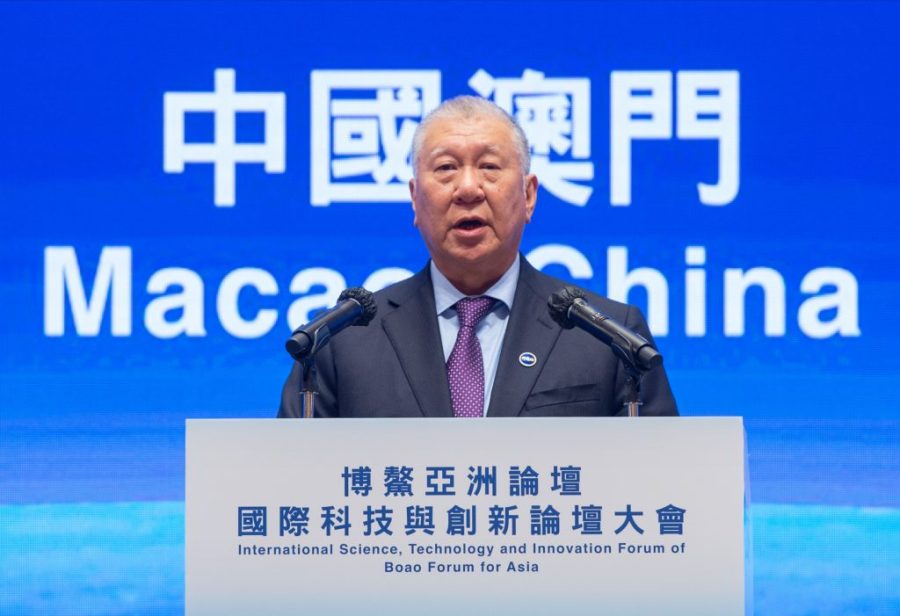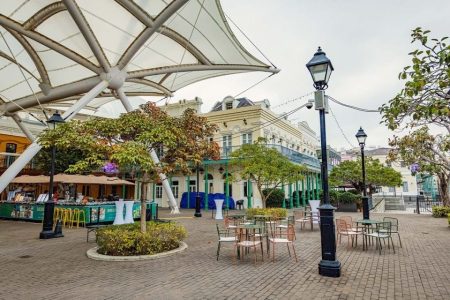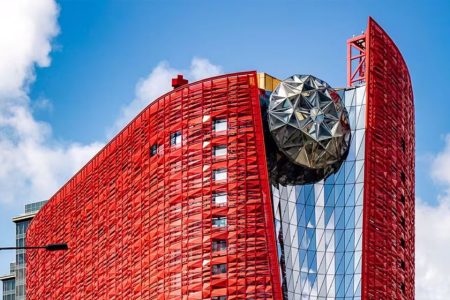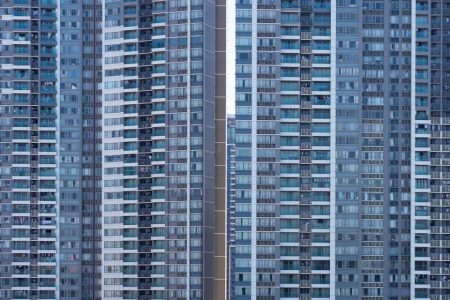By making full use of the advantages of connecting and integrating the East and the West, “Macao will strive to craft a platform for high-level international scientific and technological exchanges and co-operation, one that is in high-level convergence of international modern service industries, Edmund Ho Hau Wah, vice-chairman of the National Committee of the Chinese People’s Political Consultative Conference (CPPCC), said on Tuesday.
Ho, the first chief executive of the Macao Special Administrative Region (MSAR), made the remarks in a speech during the opening ceremony of the first International Forum on Science, Technology and Innovation (ISTIF) at the Service Platform Complex for Trade Cooperation between China and Portuguese-speaking Countries in Nam Van.
Before his speech, Ho read out President Xi Jinping’s congratulatory letter to the three-day conference
“His acknowledgement and encouragement do not only inspire us, but also lights up the direction for us to improve the ISTIF conference in the future,” Ho said, adding: “I would also like to thank Vice-Premier Han Zheng for his thought-provoking and wonderful keynote speech.”
Ho, a chartered accountant and certified auditor by profession, said that with this platform, the city aims to further integrate itself into the nation’s innovation system, promote moderate diversification of its economic development, enhance its status and function in the nation’s economic development and opening-up process. Ho said that Macao would also further contribute to the development of the Greater Bay Area (GBA) as an international science and technology innovation centre and the development driven by the nation’s innovation process, “laying a solid foundation.”
Macao will also further enrich the successful implementation of the “One Country, Two Systems” principle, based on Macao’s special characteristics, thereby “contributing Macao’s own wisdom to the great revival of the Chinese nation,” Ho said.
Ho noted that the Boao Forum for Asia (BFA) is a comprehensive high-end dialogue and co-operation platform for government officials, industry and business leaders and scholars to discuss the socio-economic development of Asia and the world. Since its establishment in 2001, “the BFA has always regarded Asia as its base with the whole world in view,” Ho said, adding that “the BFA takes promoting economic integration in Asia as its own responsibility.
“The BFA has also made positive contributions to strengthening business and investment cooperation between governments and business entities, enhancing connections, understanding and trust between enterprises within and outside the region and promoting regional cooperation in Asia and common development in a global context,” Ho said.
Ho also noted that the BFA has been always paid close attention to Macao’s economic and social development and maintained close exchanges and cooperation with the MSAR.
‘Innovation empowers sustainable development’
Addressing the opening ceremony in his capacity as president of the BFA’s International Forum on Science, Technology and Innovation, Ho noted that the theme of the first ISTIF conference is “Innovation Empowers Sustainable Development”, focusing on three modules: “Impetus for Innovation”, “Innovation and Life” and “Cooperation and Innovation”.
Ho said the conference, which ends tomorrow, aimed to shed light on topics such as 5G technology, intellectual property, artificial intelligence (AI), aerospace science and technology, traditional Chinese medicine (TCM) and biomedicine, green transformation and the application of new materials and new technologies, promoting integrated academic exchanges among five parties – the government, industry, business, academia and research.
Ho underlined that “we are witnessing major changes unfolding in our world, something unseen in a century. A new round of scientific and technological revolution and industrial change is emerging. At the same time, the COVID-19 pandemic, climate change and other challenges facing mankind are becoming more complex and severe. Nowadays, the human race needs to move forward hand in hand more than ever to overcome these difficulties. The need for international cooperation in scientific and technological innovation is becoming more urgent than ever.
“Countries and regions around the world should join international scientific and technological exchanges and co-operation with more openness, to achieve sustainable and high-quality development, to provide effective solutions for economic and social development of all countries and for improving people’s livelihoods. With the power of science and technology, we aim to push globalisation towards a healthier direction with more equality, tolerance and inclusion.”
Apart from Vice-Premier Han, former UN secretary-general of the United Nations Ban Ki-moon, who chairs the BFA, also addressed the opening ceremony by video link.
Former Philippine president Gloria Macapagal-Arroyo attended the ceremony in her capacity as BFA board member. The high-powered audience included dozens of senior local, mainland, Hong Kong and foreign officials. According to a statement by the Macao Government Information Bureau (GCS), about 1,000 people are attending the conference.
(The Macau Post Daily/Macao News)
PHOTO © Xinhua News Agency






